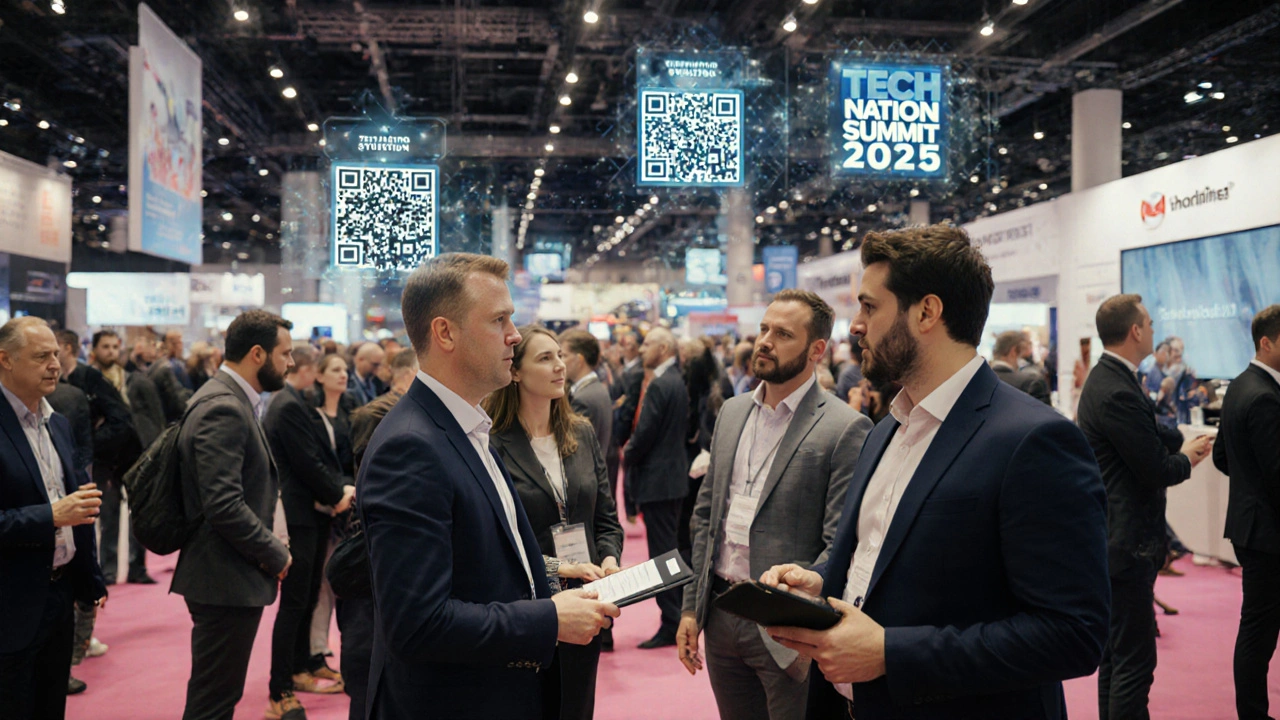
London is buzzing in 2025. Not with the usual tourist crowds, but with founders, engineers, and investors all heading to the same handful of events where the next big tech startup could be born. If you're building something in tech-whether it’s AI tools, fintech apps, or clean energy hardware-you can’t afford to miss what’s happening in the city this year. These aren’t just talks and slideshows. These are where deals get made, teams get hired, and ideas turn into companies that scale.
Why London Still Leads in Tech Events
London isn’t just another tech hub-it’s the only European city where you can walk from a seed-stage pitch at a co-working space in Shoreditch to a Series B demo day at the O2 in under 30 minutes. The city’s mix of talent, funding, and government support keeps it ahead. In 2024 alone, UK startups raised over £12 billion, and nearly 40% of that went to London-based teams. That momentum hasn’t slowed. This year, over 120 tech events are scheduled in the city, from intimate founder meetups to global expos with 10,000+ attendees.
What sets London apart? It’s the density. You’ll find investors from Sequoia, Accel, and Index Ventures walking the same halls as early-stage founders from Imperial College incubators. The city doesn’t just host events-it builds ecosystems around them. That’s why 7 out of the 10 most active startup accelerators in Europe are based here.
Top 5 Tech Conferences in London 2025
Not all events are worth your time. Here are the five that actually move the needle for startups in 2025.
1. Tech Nation Summit
Taking place at the ExCeL London on April 15-16, this is the largest gathering of UK tech founders. Over 8,000 people attended last year, and this year’s lineup includes founders from Revolut, Depop, and Monzo. The real value? The Investor Matchmaking Portal. You sign up in advance, pitch your startup in 90-second video clips, and get scheduled for 1:1 meetings with VCs who’ve already pre-screened your sector. Last year, 217 startups secured funding pitches through this system. 37 of them closed rounds within 30 days.
2. AI & Data Summit London
Hosted by the Alan Turing Institute at the Barbican Centre on May 22-23, this is the go-to for AI startups. It’s not a sales floor-it’s a deep-dive. Sessions like “Building LLMs on a £50k budget” and “How UK startups are beating OpenAI on data efficiency” draw engineers who actually ship code. The standout feature? The Open Dataset Exchange. Startups can submit anonymized datasets for peer review, and if accepted, get access to 12 curated public datasets from NHS, Met Office, and Transport for London. This isn’t theory-it’s raw fuel for training models.
3. Fintech Festival London
June 10-12 at the Queen Elizabeth Olympic Park. If you’re building payment rails, lending platforms, or compliance tools, this is your stage. Over 150 banks and fintechs are here, including Stripe, Revolut, and Monzo. But the real goldmine? The Regulatory Sandbox Booth. Run by the FCA, this lets you test new products in a live but controlled environment with real customers. Last year, 11 startups got provisional licenses on-site. One, a KYC automation tool called VeriCheck, scaled to 200 clients within six months after getting the green light here.
4. ClimateTech Connect
July 8-9 at the Business Design Centre. Climate tech is booming in London, and this event is where the funding is. Over 60 investors focused solely on decarbonization are attending, including Climate Capital and Octopus Ventures’ green fund. The standout? The Pitch to the Planet competition. Five startups get 10 minutes each to present to a panel of impact investors. The winner gets £250,000 in seed funding and a year of free lab space at Imperial’s Green Innovation Hub. Last year’s winner, a startup that turns food waste into bioplastics, is now supplying packaging to Tesco.
5. London Startup Week
September 22-28. This isn’t one event-it’s a city-wide festival. Over 200 sessions across 40 venues, from pubs in Camden to co-working spaces in Canary Wharf. The most underrated part? The Founder Swap. You register, pick a founder in a different sector, and spend 30 minutes swapping stories. Last year, a SaaS founder from Brighton met a robotics engineer from King’s College. They built a logistics AI tool together. It’s now raising a £1.2M seed round.
What You’ll Actually Get at These Events
Let’s cut through the fluff. You’re not going to a conference to collect free t-shirts. You’re going to get:
- Access to decision-makers-not just investors, but product leads at big tech firms who hire startups as vendors.
- Real feedback-not from strangers on LinkedIn, but from engineers who’ve shipped 10+ products and can tell you why your UI won’t scale.
- Partnerships-you’ll meet API providers, cloud credits programs, and legal firms that offer free tiers to early-stage startups.
- Visibility-if you pitch well, you’ll get covered by TechCrunch, Sifted, or The Information. One founder got 12,000 signups after a 5-minute demo at Tech Nation.
And yes, you’ll meet people who can hire you. Over 60% of startup hires in London last year came from events like these. Not job boards. Not LinkedIn ads. Real conversations over coffee.

How to Get the Most Out of Each Event
Going without a plan is like showing up to a poker game with no cards. Here’s how to play it right.
- Research the attendees-Use the event app or website to find who’s speaking and who’s investing. Make a list of 10 people you want to meet.
- Prepare your 30-second pitch-Not a script. A story. “We help X do Y by using Z.” Example: “We help e-commerce stores reduce returns by 40% using AI that predicts if a customer will keep a shirt based on their past reviews.”
- Bring something to give away-A QR code to a live demo, a one-pager with metrics, or even a custom URL. People remember what they can take away.
- Follow up within 48 hours-Send a short email with a specific next step: “I’d love to show you how our tool cut SaaS churn by 22% for a client. Are you free Tuesday?”
- Don’t chase every booth-Focus on 3-5 that actually solve your problem. A cloud provider offering free credits? Go. A tool that costs £5,000/month? Skip it.
What’s New in 2025
This year, there’s a shift. Events are no longer just about pitching. They’re about building.
AI & Data Summit now offers free GPU access to attendees for 72 hours. ClimateTech Connect has a live hackathon where teams build prototypes on-site and demo them to investors the same day. Tech Nation has a “Founder Visa” program-eligible startups can apply for a 12-month UK startup visa on-site with expedited processing.
And for the first time, all five major events are offering free childcare. The industry finally gets it: founders aren’t just techies-they’re parents, too.

Who Should Skip These Events
If you’re still in the idea phase-no prototype, no customers, no numbers-you might not be ready. These events aren’t for brainstorming. They’re for scaling.
Same if you’re not willing to put in the work. You can’t just show up, collect business cards, and expect magic. The people who win here are the ones who show up early, stay late, and follow up like their business depends on it-because it does.
Final Tip: Don’t Wait for the Big Event
There are dozens of smaller, free events all year. The London Startup Founders Meetup meets every other Thursday at The Work Club. The Fintech Founders Circle gathers at a pub in Shoreditch every month. These are where real relationships start. Go to one. Talk to three people. Then go again.
London’s tech scene doesn’t wait. It builds. And if you’re building something real, you’ll find your people here.
Are tech conferences in London 2025 worth attending for early-stage startups?
Yes-if you’re past the idea stage. If you have a prototype, even a small user base, or a clear revenue model, these events are gold. You’ll meet investors who’ve funded similar startups, engineers who can spot your tech flaws, and partners who offer free credits or tools. But if you’re still just sketching on napkins, save your money. Focus on building first, then show up.
How much does it cost to attend these events?
Prices vary. Tech Nation Summit is £199 for founders, but you can get free tickets through partner accelerators like Techstars or Entrepreneur First. AI & Data Summit is £149, but students and early-stage founders can apply for a 75% discount. Many smaller meetups are free. Some even pay you to speak-like ClimateTech Connect’s Pitch to the Planet, where winners get funding and free space. Always check for founder discounts-most events offer them.
Do I need to pitch to benefit from these events?
No. Pitching is just one option. Many founders attend just to learn, network, or scout competitors. You can learn more from listening to a 20-minute Q&A with a founder who scaled to £10M in revenue than from five hours of cold pitching. The best attendees are the ones who ask questions, not just promote themselves.
Can international founders attend these events?
Absolutely. London is one of the most startup-friendly cities in the world for non-UK founders. Many events have special visa support-Tech Nation Summit offers on-site applications for the UK Startup Visa. You’ll find founders from over 60 countries at these events. Just make sure you have a valid visa. Some events require proof of travel plans, so keep your itinerary handy.
What should I bring to a tech conference in London?
A phone with your pitch video saved offline, a portable charger, business cards (or a QR code link to your demo), and a notebook. Don’t bring a laptop unless you’re presenting. Most events have Wi-Fi, but it’s unreliable. Also, wear comfortable shoes-you’ll walk 10,000+ steps a day. And bring a jacket. London’s conference centers are freezing.
Are there events for non-technical founders?
Yes. Events like Fintech Festival London and London Startup Week have tracks focused on marketing, fundraising, legal compliance, and customer growth. You don’t need to code to benefit. Many founders who attend are sales leads, product managers, or operators. Look for sessions on “Scaling Without Tech Debt” or “How to Hire Your First Engineer”-those are gold for non-technical founders.
How do I find out about smaller, hidden tech events in London?
Join Slack groups like London Tech Founders or Startup Grind London. Follow @LondonStartups on X (Twitter). Subscribe to the newsletter from Tech Nation and Sifted. Many events aren’t advertised publicly-they’re invite-only or posted on community boards. The best ones are shared by founders who’ve been there. Show up to one big event, talk to three people, and ask: “Where else do you go?”
Startups don’t win because they have the best idea. They win because they showed up, talked to the right people, and kept going. London in 2025 is full of chances. Don’t miss yours.